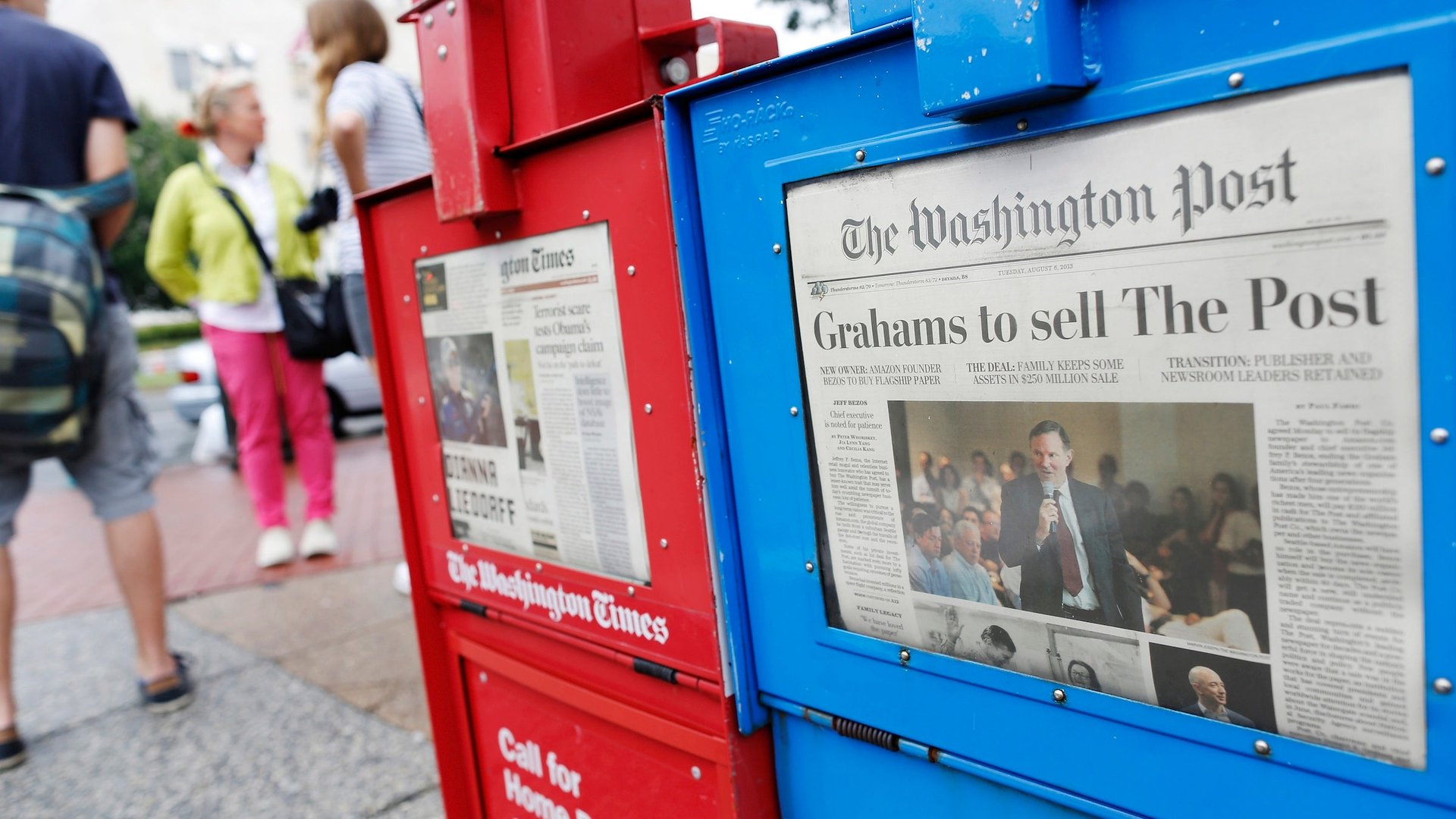Quartz Weekend Brief—Newspaper buyers, Apple chargers, ban tipping, be angry
Good morning, Quartz readers!


Good morning, Quartz readers!
The easiest way to identify the next round of newspaper acquisition targets is to look for those denying it. “The Times is not for sale,” Arthur Sulzberger, publisher of the New York Times, felt compelled to tell his staff this week. He was reacting to the sale of the Washington Post, another family-controlled newspaper that said it would never give up control—until Amazon CEO Jeff Bezos came along on Monday and snapped up the paper for $250 million. Other major newspapers that are officially not for sale include Pearson’s Financial Times and Tribune’s Los Angeles Times. Likely stories.
We are not disinterested parties here. A real shakeup of English-language newspapers could accelerate the disruption that has chipped away at our industry over a decade. New owners may not be able to save newspapers, but their attempts are likely to be more interesting than those with a legacy to protect. A few days before the Post went, the Times Co. sold the Boston Globe to John Henry, an investor better known for his holdings in sports teams.
Bezos was an unexpected choice that seemed inspired in retrospect: an admired entrepreneur who, in his day job, has not shown an aversion to losses nor a lack of creative ambition—though a newspaper is admittedly a very different business from the one he’s used to. He allowed the Graham family, which always said it would protect the Post at all costs, to save face. The question looming over the industry right now is who else might fit that mold. Are there enough brash benefactors out there?—Zachary M. Seward
Five things on Quartz we especially liked
Apple’s charger exchange program is genius. By agreeing to sell anyone who brings in a counterfeit iPhone or iPad charger an Apple-made one at a discount, the company is both warding off bad publicity and attracting new customers, argues Adam Pasick.
Why a boycott of Russian vodka is misguided. Despite its symbolic value in the protest against Russia’s treatment of gay people, vodka is a minor US import, and owing to a trademark dispute over Stolichnaya, it could actually play into the Russian government’s hands, writes Lily Kuo.
Two opposed views on China. The optimist: Yichuan Wang, who says China’s poorer regions will counteract slowing growth. The pessimist: Gwynn Guilford, who explains why record imports of iron ore tell us something really bad about the steel industry and about Chinese finance in general.
Restaurants should just ban tipping. The founder of a San Diego eatery, Jay Porter, explains persuasively why tips paradoxically create incentives for worse service—and how when he got rid of them, service improved and revenues went up.
When global warming finally gets going, it could last for 200,000 years. Rachel Feltman explains two new studies indicating that feedback loops will create a tipping point in carbon dioxide concentration, after which warming will accelerate, and then be very, very slow to recover.
Five things elsewhere that made us smarter
How Eike Batista lost Brazil’s biggest fortune. This Financial Times profile of the Brazilian tycoon laid low when his oil wells proved to be duds is not only a good fall-from-grace yarn, but is telling about the power of a good story to extract billions from hardened investors.
Fifteen ways the credit crunch changed British lives. In an intriguing bit of ad hoc sociology that brings economics to life, the Telegraph’s Harry Wallop looks at how the recession altered spending and living habits. Oddest factoid: Men bought tighter underwear.
Ask the angry person in your meeting for advice. We associate anger with irrationality, but research finds that someone angry is more likely to seek out opposing views and avoid “confirmation bias.”
Open-source hardware is revolutionizing manufacturing. Much as open-source software allows vast communities of programmers to collaborate and innovate faster than big software firms, 3D printing has enabled the rise of a generation of hardware “hackers”. Traditional manufacturers, watch out.
Should you be stalking your kids? Long before PRISM, tech journalist Mathew Ingram subjected his daughters’ online lives to a decade-long surveillance program. He writes with commendable honesty about what he learned and whether he’d do it again. Parts one, two and three are up; part four on Monday.